Background:
This article analyzes a recent Reddit thread on OEM vs. aftermarket ignition-coil reliability, spotlights the fallacies that repeatedly surfaced, and offers my thoughts on insisting on having proper evidence.
Recently, I participated in a discussion where the topic of aftermarket ignition coils was mentioned, with one person remarking that they are unreliable.
As the quotes I’ve chosen to spotlight in this blog suggest, I’m a proponent of drawing conclusions based on facts.


Note: No published failure-rate comparisons exist that I have found. If you’re aware of a report, statistics, or study, please share a link in the comments.
Consumer Claim:
The gist of the claim that prompted my involvement was:
Get rid of those APR coils (all of them)… … They’re also notoriously unreliable.
Consumer Statement about Coil Reliability
I’ve written about the challenges of comparing product reliability, which requires a substantial amount of high-quality data, and decided to join the discussion to draw attention to that fact.

Another person responded to me with a statement that relies on a logical fallacy as their premise to disprove my claim about the lack of supporting evidence.
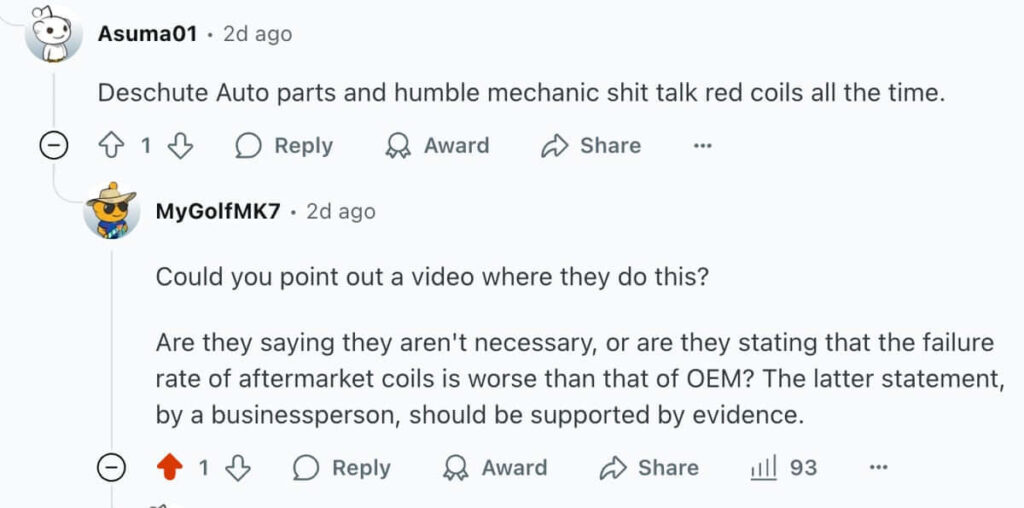
The fallacy they are invoking is the Appeal to Authority.
You said that because an authority thinks something, it must therefore be true.
This exchange went nowhere, but it is an example of a frequent, weak form of argument that appears on social media, where logical fallacies can proliferate disagreements between auto enthusiasts.
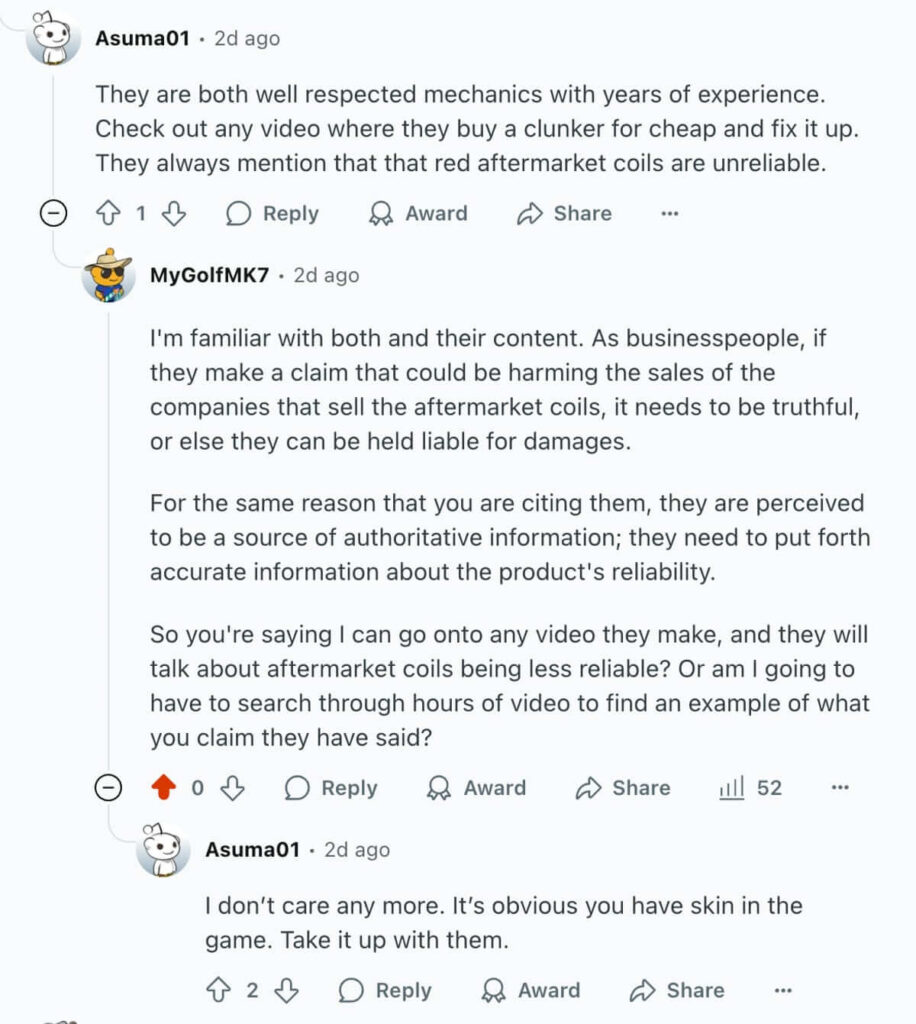
Argument Analysis – Part One
In this example, Asuma01 relies on several logical fallacies when arguing their position.
Appeal to Authority
“Deschute Auto parts and humble mechanic shit talk red coils all the time.”
“They are both well respected mechanics with years of experience… They always mention that red aftermarket coils are unreliable.”Reddit member Asuma01
Simply invoking “respected mechanics” without pointing to which videos, when, or what exactly they said is an appeal to authority—and a weak one, because it’s entirely unspecified.
Anecdotal Evidence
Check out any video where they buy a clunker for cheap and fix it up. They always mention that… coils are unreliable.
Reddit member Asuma01
Even if those mechanics did mention aftermarket coils once or twice, that’s an anecdote, not systematic data. A handful of mentions in repair videos doesn’t equate to a statistically valid failure rate. Anecdotes can highlight possibilities (“that one guy’s coil failed…”), but they can’t tell you how often or why failures occur.
Burden of Proof
I don’t care any more. It’s obvious you have skin in the game. Take it up with them.
Reddit member Asuma01
After making an adverse claim, the consumer refuses to produce their evidence and instead shifts responsibility back onto me (“take it up with them”). That’s a burden-shifting fallacy. It makes it sound as if the claim stands unchallenged unless I do all the work, whereas in proper debate, the claimant must first supply at least one verifiable reference.
Moving the goalposts
Throughout the thread, whenever asked for specifics, this consumer either retreats (“I don’t care any more”) or doubles down on vagueness (“check any video”). This is a form of goalpost-moving: refusing to satisfy any request for concrete evidence while insisting the evidence is “out there.”
Next Consumer
Another consumer then took up the argument, continuing the use of logical fallacies and demonstrating the Dunning-Kruger effect.
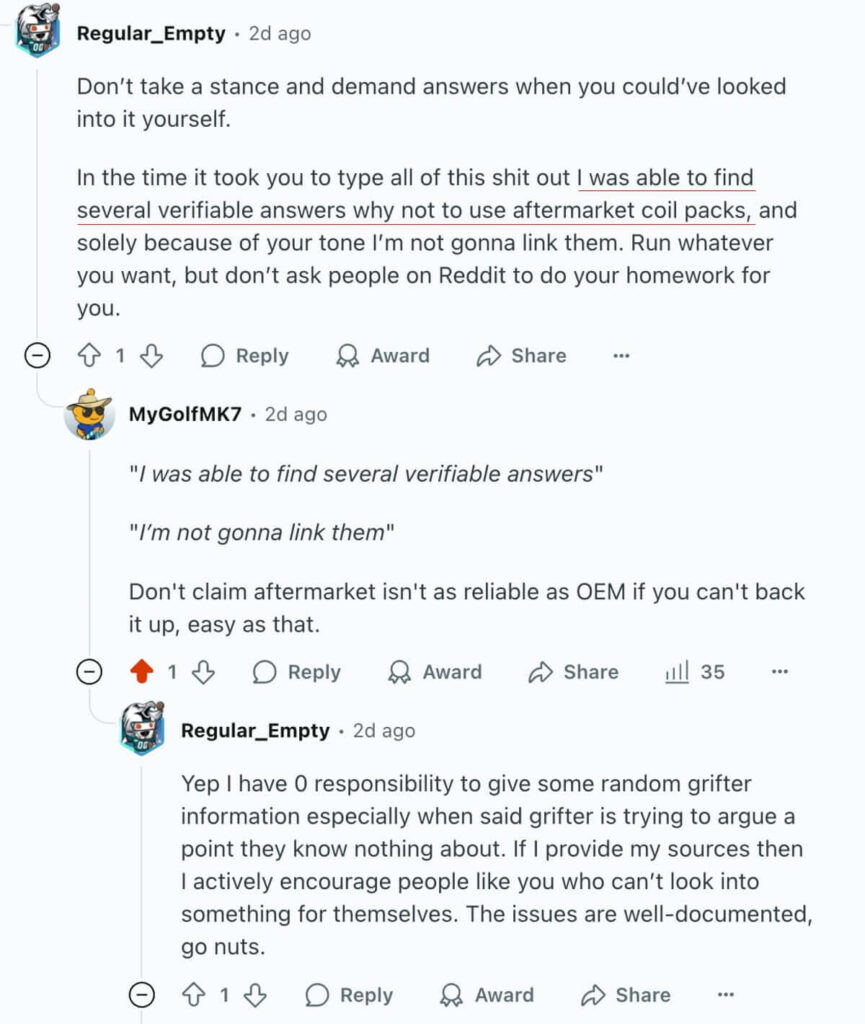
Argument Analysis – Part Two
Burden of Proof
Here, Regular_Empty also leans on the Burden of Proof fallacy. By saying “go do your own homework” and refusing to provide the evidence themselves, they’re shifting the burden of proof back onto me.
In any rational debate, the person making a claim (“I was able to find several verifiable answers why not to use aftermarket coil packs.”) must provide the data or sources that support it.
In their second response, they double down on the Burden of Proof – They insist I “go look it up yourself” even though they made the claim. That claim (“aftermarket coils are less reliable”) still needs backing.
Ad Hominem
Instead of addressing the substance of my request, they attack my supposed “tone” (“solely because of your tone I’m not gonna link them”). That’s an Ad Hominem: dismissing my argument based on how I supposedly said it rather than on its merits.
The second response also repeats the Ad Hominem, calling me a “random grifter” and accusing me of “knowing nothing” attacks me, not the argument or evidence.
Next exchange:
In Regular_Empty’s opening comment, they claimed they were able to find “several verifiable answers why not to use aftermarket coil packs“, and now they are arguing that “I’m not making a claim,”
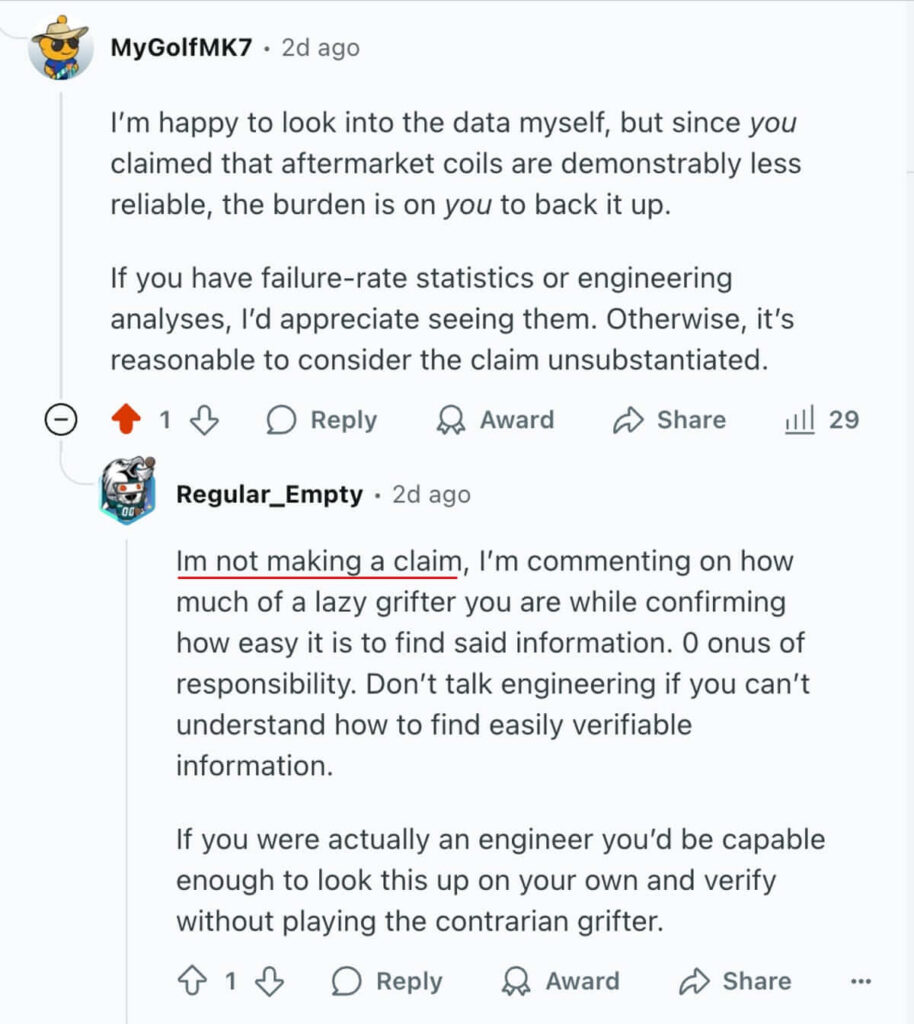
This is more of the same two fallacies:
Burden of Proof
By claiming “0 onus of responsibility” even after making (or implying) the reliability claim, they’re refusing to supply the evidence that they alone should produce.
Ad Hominem
Insulting me as a “lazy grifter” and saying “if you were actually an engineer you’d…,” they’re dismissing my arguments based on who I am (and redefining “engineer” to exclude me) rather than on any evidence.
Dunning-Kruger Effect
Dunning-Kruger is a reference to a cognitive bias.
The Dunning-Kruger effect is a cognitive bias in which people wrongly overestimate their knowledge or ability in a specific area. This tends to occur because a lack of self-awareness prevents them from accurately assessing their own skills.
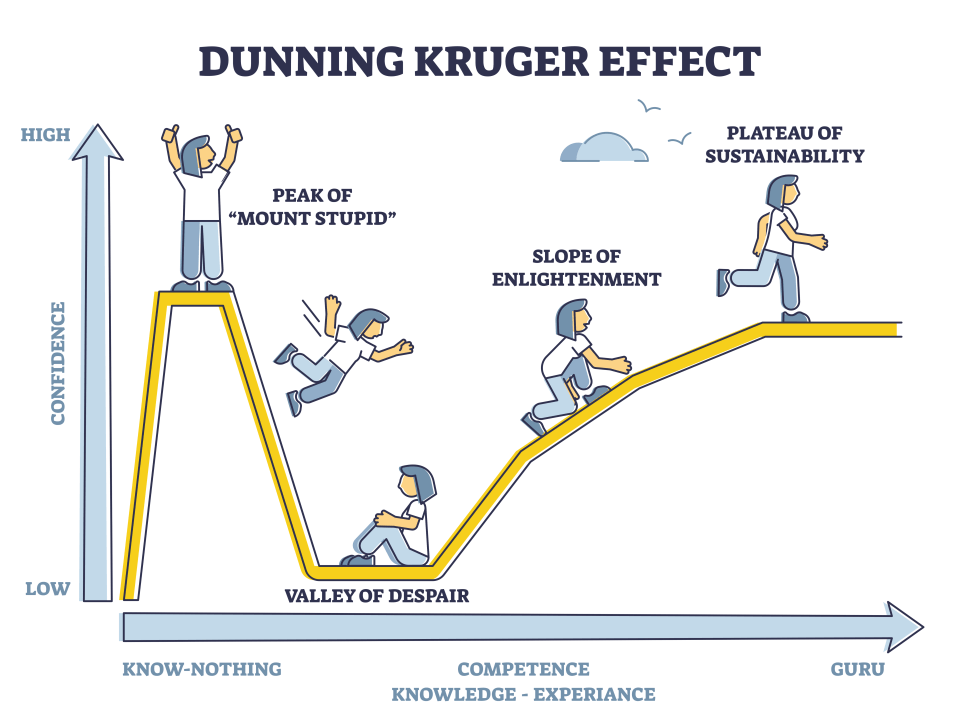
“Don’t talk engineering if you can’t understand how to find easily verifiable information.”
Reddit member Regular_Empty
They assume that because the information is “easy” for them to find (or claim it is), I must be incompetent if I can’t. This reflects an overestimation of their understanding of the topic.
If you were actually an engineer, you’d be capable enough to look this up on your own…
Reddit member Regular_Empty
They presume that ‘real engineers’ possess mastery of every piece of relevant data and research technique. Domain experts are aware of the limitations of their knowledge and the effort required to identify high-quality data.
I’m not making a claim… I’m confirming how easy it is to find said information. 0 onus of responsibility.
Reddit member Regular_Empty
By insisting they bear no burden to supply evidence, they fail to see that claiming information is “out there” is itself a positive assertion. Their refusal to acknowledge the need for concrete data reveals a lack of awareness of what constitutes a rigorous argument.
lazy grifter… contrarian grifter
Reddit member Regular_Empty
They attribute “grifting” and laziness to me rather than examining whether their reasoning or evidence is sound. This projection is found among those who lack the insight to evaluate both sides of an argument.
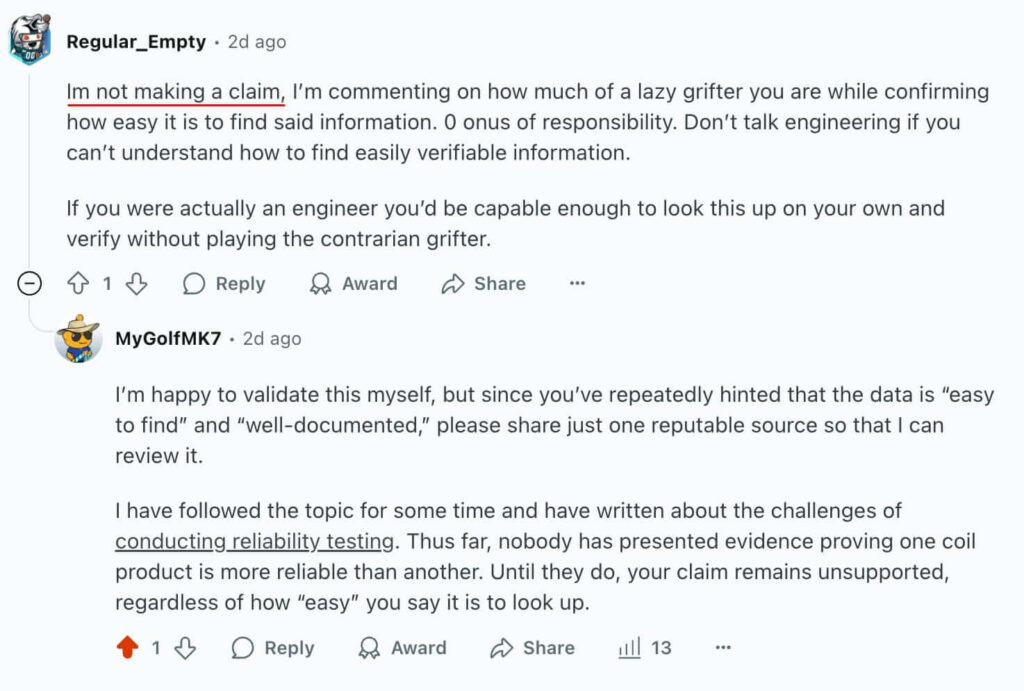
On the Dunning-Kruger chart, Regular_Empty is parked on the peak of Mt. Stupid. This is where a person with little relevant knowledge conveys their opinion with unjustified confidence.
Conclusions:
The notion that aftermarket ignition coils are less reliable than OEM brands is frequently mentioned by Mk7 owners.
I have never come across strong evidence to support this conclusion. When two other car enthusiasts took the position that they are less reliable, they were pressed for evidence and resorted to responding with logical fallacies.
Note: If you believe you have seen evidence comparing the reliability of OEM coils to aftermarket coils, please leave a link in the comments so I can check it out.
The Dunning-Kruger Effect is a cognitive bias that often leads to a defensive reaction when asked for proof, as seen in this post, where consumers insist that any reasonable person should already know—or easily find—the data.
Whenever someone dismisses the need for evidence because “it’s obvious” or “easy to find” (also phrased as “I’m not doing your homework“), be alert: they may be unaware of their gaps in knowledge and overconfident in their assumptions.

This one is brutal. Zero data beyond anecdotal. Basically a rumor. Had the APRs for years without issue. I seem to remember Arin with APR responding in a post somewhere with numbers sold vs. returns and it was a v. small fraction. Plenty of OEM coils fail…
I have indeed worked on more than one car with APR coil failures and many failed Accel coils over the years. I have a generally positive perception of Holley brand products and install them without concern but we advise customers against their ignition products based on anecdotal observations within our own shop. Nobody is able to give you a failure rate on these, not even Holley since I am sure most people do not warranty them. That being said, much like the 91006 spark plug outrage, I am sure it is blown out of proportion.
A while back I came across a comment from an employee with New German Performance (in business since 1997, locations in MD and VA) that they had not “seen” a higher failure rate of the APR coils they sell, versus OEM. Opposing anecdotal positions don’t advance the topic.
Failure rate centers around probabilities, since having truth data for an entire population of products is impractical to impossible. Sampling and estimation can provide sufficient information to make a better decision, but I have not seen any instance of this being done to compare OEM and aftermarket coils.